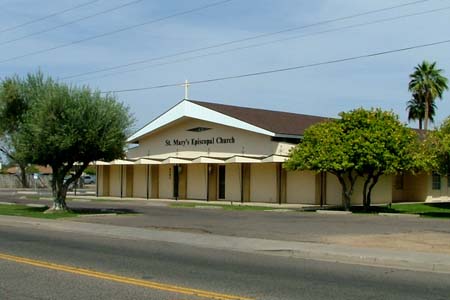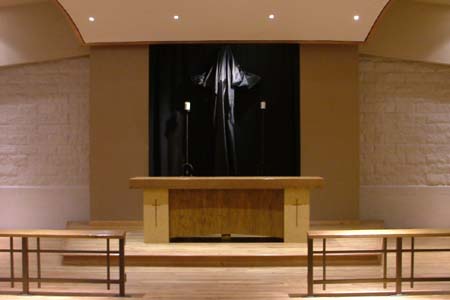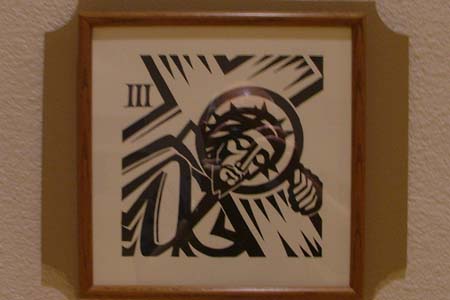| |
 |
 |
 |
| Comment on this report, or find other reports. |
 |
| Our Mystery Worshippers are volunteers who warm church pews for us around the world. If you'd like to become a Mystery Worshipper, start here. |
 |
| Find out how to reproduce this report in your church magazine or website. |
|
|
| 2363: St Mary’s,
Phoenix, Arizona, USA |
 |
 |
 |
Mystery
Worshipper: Amanda B. Reckondwythe.
The church:
St Mary’s,
Phoenix, Arizona, USA.
Denomination:
The Episcopal
Church, Diocese
of Arizona.
The building:
A wide, flat cinderblock building. The inside is plain and stark
but tasteful. Behind the altar hung a black drape against which
was a large crucifix also draped in black, flanked by two candles.
Stations of the cross made to look like India ink drawings lined
the walls – I’ll have more to say about these in a moment.
The church: St Mary’s is Phoenix’s Anglo-Catholic parish par excellence, with all the ceremony, vestments, incense, tat, and pew calisthenics that go with the title. From their website: "We welcome and include everyone – especially those who may have felt unwelcome in other churches." Their website also has the good vision to link to the Ship of Fools.
The neighborhood:
St Mary’s is located on 39th Avenue at Maryland Avenue, a poor
but clean-scrubbed residential neighborhood. There is a school
next door to the church, and another school across Maryland
Avenue.
The cast:
The Revd R. Craig Bustrin, vicar, was the officiant. He was
assisted by two deacons who were not named. Neither were the
verger, two acolytes, another lady whose role was not clear
at first, nor the lector named. Matthew Scott served as cantor,
and Jeffrey Shy played the organ. The officiant and deacons
were vested in albs and purple chasuble or dalmatics, respectively;
all others wore black cassocks save for the organist, who wore
his blue choir cassock; the cantor, who wore a black shirt and
black slacks; and the lector, who wore street clothes.
The date & time: Good Friday, April 6, 2012, 7.00pm.
What was the name of the service?
Solemn Good Friday Liturgy.
How full was the building?
I counted room for 200. There were 20 present.
Did anyone welcome you personally?
I arrived about an hour early, misjudging how long it would
take me to have dinner beforehand. Father Bustrin saw me pulling
into the parking lot and gave me a quizzical look. Out my car
window, I asked him if the service started at 7.00 and added
that I knew I was early. He invited me into the parish house
where, he said, there were comfortable sofas I could wait on.
About one-half hour before the service time, I walked over to
the church. There were several people waiting on the porch,
but no one spoke to me. As I entered, a gentleman said, "Here’s
a bulletin for you."
Was your pew comfortable?
Yes. Plain wooden pews with fold-down kneelers.
How would you describe the pre-service
atmosphere?
There was quite a bit of talking out on the porch, but once
people got inside they were quiet for the most part. Three little
old ladies were sitting quietly together in a pew until a gentleman
came up to them and engaged them in a rather lengthy conversation.
That set them abuzz and they didn’t calm down until the service
was about to start.
What were the exact opening words of the
service?
The verger knocked on the floor three times with his wand and
then led the altar party in: verger, two acolytes, the aforementioned
lady whose role was not clear, the two deacons, and the officiant.
The clergy prostrated themselves for several minutes on the
floor before the altar. When they arose, the officiant intoned:
"Blessed be our God" to which the response was: "For ever and
ever, Amen."
What books did the congregation use during the
service?
A service leaflet contained everything we needed.
What musical instruments were played?
I was surprised to hear the organ (a small tracker instrument
at the back of the church) accompany the reproaches, especially
after reading a lengthy insert to the bulletin explaining why
the organ, on this day, "offers its breathless silence" in the
"enveloping darkness." It did, however, remain silent otherwise.
Did anything distract you?
The India ink-style stations of the cross, while striking, were not in numerical order! Indeed, they appeared to have been put up randomly. I wondered why.

Was the worship stiff-upper-lip, happy clappy, or
what?
It was the standard Good Friday liturgy, chanted almost entirely
to the prescribed Gregorian chant settings. The reproaches were
chanted in Greek and English. We were given a variety of suggestions
for how to venerate the cross when the time came to do so: by
approaching either shod or barefoot, genuflecting, and then
kissing it while kneeling; by bowing deeply before it; or by
remaining prayerfully seated. The Blessed Sacrament was brought
in from the altar of repose to the sound of the crotalus – shaken,
I might add, by the lady whose role was previously unclear.
"Ah," I thought, "now I can call her the Crotalus Lady." After
communion, the remaining hosts were consumed by the altar party
and the empty ciborium was left tipped over on its side on top
of the corporal.
Exactly how long was the sermon?
4 minutes.
On a scale of 1-10, how good was the preacher?
8 – Father Bustrin’s sermon was succinct and to the point, but I thought he spoke a little too softly to be clearly understood.
In a nutshell, what was the sermon
about?
His text was Jesus’ remark to Pilate: "You would have no power over me unless it had been given you from above" (John 19:11). Pilate thought that he held the power of the cross over Jesus, but Jesus knew otherwise. In the hands of humans, the cross stands for death, tragedy, questioning of faith. But in the hands of God, it stands for reconciliation, triumph, belief. The cross represents what God believes about us.
Which part of the service was like being in
heaven?
The chanting was lovely, especially the Christus factus
est, the reproaches, and the passion complete with weeping
tone. For the chanting of the passion, the cantor (a baritone)
took the narrator part, the officiant (a bass) Jesus, and one
of the deacons (a tenor) Pilate and the turba. I would have
preferred that Pilate be done by one deacon and the turba either
by the other or by a choir.
And which part was like being in... er... the other place?
I’m listing these here only because they surprised me in what
was otherwise a near faultless liturgical celebration: candles
in the entrance procession, the use of organ, the organist in
blue choir robe, the verger (not the officiant or deacon) unveiling
the cross during the reproaches, the Crotalus Lady wearing blue
and white striped tennis shoes beneath her cassock (otherwise
the haberdashery was impeccable).
What happened when you hung around after the service looking lost?
Everyone left in silence, as we had been instructed to do. Father Bustrin gave everyone a hug on their way out. As I hugged him, I handed him my Mystery Worship calling card (there had been no collection), remarking that since their website linked to the Ship of Fools, I would give him this in person.
How would you describe the after-service
coffee?
There was none, but the service had lasted two hours and it was late. As I stepped out into the parking lot, I was thrilled to see a bright full moon bathing everything in its luminescence.
How would you feel about making this church your regular (where 10 = ecstatic, 0 = terminal)?
8 – It’s too far for me to travel every Sunday, but clearly they do things right here. I’ll be back on another occasion.
Did the service make you feel glad to be a
Christian?
Yes.

What one thing will you remember about all this in seven days' time?
The stations of the cross apparently in random order. |
|
|
 |
 |
 |
| We rely on voluntary donations to stay online. If you're a regular visitor to Ship of Fools, please consider supporting us. |
 |
 |
 |
| The Mystery Pilgrim |
 |
| One of our most seasoned reporters makes the Camino pilgrimage to Santiago de Compostela in Spain. Read here. |
 |
 |
 |
| London churches |
 |
| Read reports from 70 London churches, visited by a small army of Mystery Worshippers on one single Sunday. Read here. |
| |
|
|
|
|


